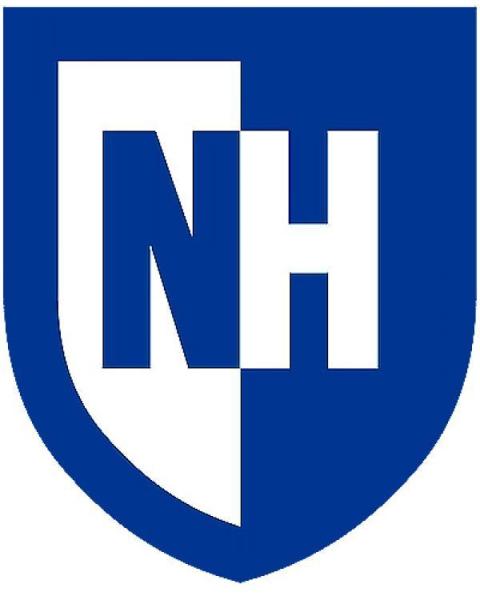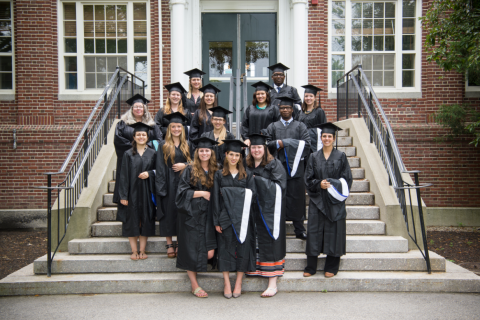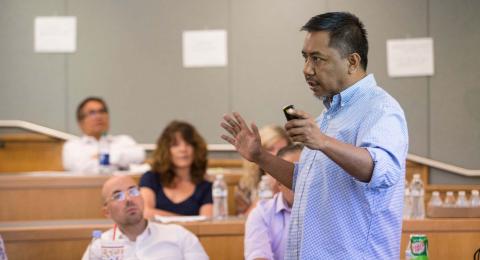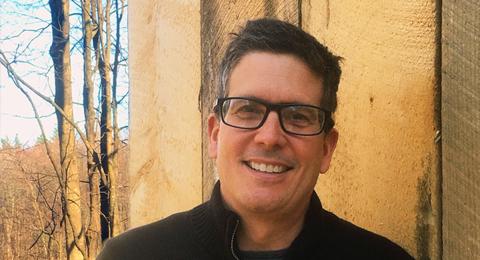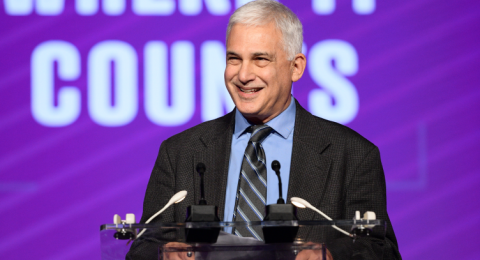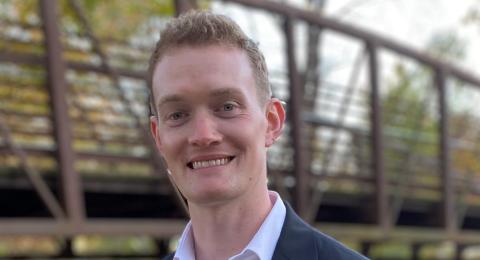The Master's in Community Development (MCD) program is completely online with weekly required synchronous components. This program allows students to bridge theory and practice to drive real change in the community. Acquire universal skills for sustainable transformation while engaging in cooperative online learning that fosters camaraderie among peers and instructors. Your future in community development starts here.
Application Deadlines: Apr. 15 (Summer Term) ● Aug. 1 (Fall Term) ● Dec. 15 (Spring Term)
- 100% Online
- 36 Credit Hours
- 14 Months
- No GRE Required
- Tuition Cost
WHY GET A MASTER’S DEGREE IN COMMUNITY DEVELOPMENT?
Geared toward working professionals, our M.A. in Community Development (MCD) will equip you for a myriad of careers and jobs while preparing you through real-world training and connecting you to community-based partners and practitioners. You’ll learn the basis of community engagement and establish a foundation in sustainable and effective community development practices, all while learning to apply these skill sets across different sectors, including housing, health, finance, business development and more.
WHY CHOOSE UNH’S GRADUATE PROGRAM IN COMMUNITY DEVELOPMENT?
In our online community development degree program, you’ll learn from seasoned practitioners in economics, finance, organizational management, health and safety, and sustainable development. You’ll apply effective engagement and problem-solving techniques while working directly with a community on a four-term capstone project. You’ll also grow your professional network, connecting with respected experts across disciplines and continents. Designed for working professionals, this community development program enables you to earn your degree in just 14 months. No GRE is required for this program.
POTENTIAL CAREERS
- Business development officer
- Community development director
- Community engagement coordinator
- Economic development director
- Fundraising coordinator
- International development officer
- Nonprofit manager
- Policy analyst
- Project manager
- Program coordinator
- Social impact analyst
Curriculum & Requirements
The Online MA in Community Development Policy and Practice program (MCD) prepares you for a career in community and economic development. While earning this online, cohort-based community development degree, you will tackle real-world situations through a capstone community project and engage with leading experts and academics in a program designed for working professionals just like you. Through coursework and experiential opportunities, you will learn practitioner-focused and community-centered approaches and strategies in development finance, policy analysis, organizational development and project management for participatory and impactful change. Professionals with five or more years of relevant work experience can enroll in the 12-month Executive MCD program with reduced degree requirements (30 credits vs. 36 credits for the MCD program) and lower tuition cost.
- The MCD program is fully online and is ideal for working professionals
- Gain effective community development skills and tools through an applied four-term capstone project in your community which can be done with your organization as part of your work
- Connect with respected field experts across disciplines, including faculty and peers
- Start in the fall, spring, or summer and graduate in as little as 12 months (Executive MCD) or 14 months (MCD)
- The MCD program consists of 12 courses (36 credits)
- The GRE is not required to apply to this degree program
Program Delivery & Location: Core academic courses for the MCD degree are offered online with choices for taking elective courses online or in person on UNH campuses. Students who choose to participate in the Washington DC Colloquium experience will join students from other Carsey programs for a week in Washington, DC. And, students are free to carry out their capstone projects in their chosen community.
MCD Sample Degree Plan (36 Credits): Fall Start
| First Year | ||
|---|---|---|
| Fall | Credits | |
| Term 1 | ||
| DPP 801 | Integrative Approaches to Development Policy and Practice | 3 |
| DPP 980 | Introduction to Community Development Projects 1 | 3 |
| Term 2 | ||
| DPP 806 | Organizational Management and Leadership | 3 |
| DPP 981 | Project Design and Planning 1 | 3 |
| Credits | 12 | |
| Spring | ||
| Term 3 | ||
| DPP 802 | Economic Analysis for Development | 3 |
| DPP 982 | Project Implementation and Monitoring 1 | 3 |
| Term 4 | ||
| DPP 805 | Fiscal Management for Development Organizations | 3 |
| DPP 983 | Project Evaluation 1 | 3 |
| Credits | 12 | |
| Summer | ||
| Term 5 | ||
| DPP 808 | Policy Seminar | 3 |
| MCD-Approved Elective Course 2 | 3 | |
| Credits | 6 | |
| Second Year | ||
| Fall | ||
| Term 1 | ||
| MCD-Approved Elective Course 2 | 3 | |
| MCD-Approved Elective Course 2 | 3 | |
| Credits | 6 | |
| Total Credits | 36 | |
MCD Sample Degree Plan: Spring Start
| First Year | ||
|---|---|---|
| Spring | Credits | |
| Term 3 | ||
| DPP 802 | Economic Analysis for Development | 3 |
| MCD-Approved Elective Course 2 | 3 | |
| Term 4 | ||
| DPP 805 | Fiscal Management for Development Organizations | 3 |
| MCD-Approved Elective Course 2 | 3 | |
| Credits | 12 | |
| Fall | ||
| Term 1 | ||
| DPP 801 | Integrative Approaches to Development Policy and Practice | 3 |
| DPP 980 | Introduction to Community Development Projects 1 | 3 |
| Term 2 | ||
| DPP 806 | Organizational Management and Leadership | 3 |
| DPP 981 | Project Design and Planning 1 | 3 |
| Credits | 12 | |
| Second Year | ||
| Spring | ||
| Term 3 | ||
| DPP 982 | Project Implementation and Monitoring 1 | 3 |
| Term 4 | ||
| DPP 983 | Project Evaluation 1 | 3 |
| Credits | 6 | |
| Summer | ||
| Term 5 | ||
| DPP 808 | Policy Seminar | 3 |
| MCD-Approved Elective Course 2 | 3 | |
| Credits | 6 | |
| Total Credits | 36 | |
NOTES:
- 1
With full faculty support, students carry out a four-term capstone project in their communities by completing actionable assignments throughout the series of four (4) applied project courses.
- 2
A variety of MCD elective courses and other Carsey graduate courses are offered each term (ELECTIVES). This includes the MCD Independent Study course (DPP 990) taken under the guidance of an MCD faculty member. Students wishing to pursue elective courses outside of the MCD program should consult with their Graduate Academic Advisor for guidance and approval.
Students enrolled in the Carsey School's MA in Community Development Policy and Practice program (MCD) are required to complete a 36-credit program, consisting of 12 courses including a four-term capstone project:
- Five (5) CORE Curriculum Courses
- Four (4) EXPERIENTIAL LEARNING Curriculum Courses
- Three (3) ELECTIVE Courses
These provide the applied foundational community and economic development skills in strategy, practice, and analysis for a successful career in community development. In this program, students will examine each of the core interdisciplinary areas within the cross-cutting lenses of public policy, data collection, and analysis as students directly apply what they learn in the classroom through a capstone project centered on community engagement for sustainable development. Further opportunities for depth and specialization are provided through a variety of elective courses which vary each year as well as the opportunity to conduct independent studies to delve deeper into a specific aspect of a student's community or capstone project.
| Code | Title | Credits |
|---|---|---|
| CORE Curriculum Courses (5 Courses) | ||
| DPP 801 | Integrative Approaches to Development Policy and Practice | 3 |
| DPP 802 | Economic Analysis for Development | 3 |
| DPP 805 | Fiscal Management for Development Organizations | 3 |
| DPP 806 | Organizational Management and Leadership | 3 |
| DPP 808 | Policy Seminar | 3 |
| EXPERIENTIAL LEARNING Curriculum Courses (4 Courses) 1 | ||
| DPP 980 | Introduction to Community Development Projects | 3 |
| DPP 981 | Project Design and Planning | 3 |
| DPP 982 | Project Implementation and Monitoring | 3 |
| DPP 983 | Project Evaluation | 3 |
| ELECTIVE Courses (3 Courses) 2 | ||
| Three (3) MCD-Approved ELECTIVE Courses | 9 | |
| Total Credits | 36 | |
- 1
With full faculty support, students carry out a four-term capstone project in their communities by completing actionable assignments throughout the series of four (4) applied project courses.
- 2
A variety of MCD elective courses and other Carsey graduate courses are offered each term (ELECTIVES). This includes the MCD Independent Study course (DPP 990) taken under the guidance of an MCD faculty member. Students wishing to pursue elective courses outside of the MCD program should consult with their Graduate Academic Advisor for guidance and approval.
This graduate program is approved to be taken on an accelerated basis in articulation with certain undergraduate degree programs.
General Accelerated Master's policy, note that some programs have additional requirements (e.g. higher grade expectations) compared to the policy.
Please see the Graduate School website and contact the department directly for more information.
Accelerated Master's Progam Eligible: Yes-MCD Only (not applicable for the Executive MCD program)
The 36-credit Community Development Policy and Practice (M.A.) program (MCD) allows eligible undergraduate seniors to enroll in graduate level courses which can fulfill requirements for both their undergraduate and graduate degree programs. Students can apply to the Accelerated Master's MCD program during their junior or senior year. Please review details on eligibility requirements for admission.
Eligible students who are admitted to the Accelerated Master's MCD program may complete up to 12 credits (four 3-credit courses) at the 800-level during their undergraduate senior year (unless otherwise indicated below), Credit earned counts toward both the undergraduate program and graduate degree.
The 36-credit Community Development Policy and Practice (M.A.) program (MCD) is approved to be taken on an accelerated basis in articulation with the below undergraduate programs.
The graduate 800-level courses listed below have been approved to be completed in the undergraduate senior year and earn credit toward both the undergraduate programs listed below and the Community Development Policy and Practice (M.A.) degree program.
Accelerated Master's students should always consult with their Graduate Academic Advisor for course selection guidance.
College of Health and Human Services
| Code | Title | Credits |
|---|---|---|
| Recreation Management & Policy: Outdoor Leadership and Management Option (B.S.) | ||
| Recreation Management & Policy: Program and Event Management Option (B.S.) | ||
| Recreation Management & Policy: Therapeutic Recreation Option (B.S.) | ||
| Students may select up to four (4) 800-level courses (12 credits total) from the following: | ||
Community Development Policy and Practice (M.A.) courses: | ||
DPP 801 | Integrative Approaches to Development Policy and Practice | |
DPP 802 | Economic Analysis for Development | |
DPP 805 | Fiscal Management for Development Organizations | |
DPP 806 | Organizational Management and Leadership | |
Global Conflict & Human Security (M.S.) courses: | ||
GCHS 810 | Conflict & Human Security | |
GCHS 820 | Global Governance | |
GCHS 830 | International Development & Human Security | |
GCHS 840 | Sustainable Development: Gender-Environment Nexus | |
GCHS 850 | Peace and Human Security in the Post-Atrocity State | |
Public Administration (M.P.A.) courses: | ||
PA 800 | Foundations and Theories of Public Administration | |
PA 802 | Grant-writing for Public and Non-profit Sectors | |
PA 809 | Organization and Management in Public and Non-profit Sectors | |
PA 812 | Leadership Theory and Practice | |
PA 818 | Non-Profit Management | |
PA 819 | Managing Conflict and Change in Nonprofit and Public Organizations | |
PA 820 | Strategic Communications for Public and Non-profit Sectors | |
PA 821 | Effective Change Management in Nonprofit and Public Organizations | |
Public Policy (M.P.P.) courses: | ||
PPOL 806 | Fundamentals of Policy Analysis | |
PPOL 810 | Policy Across Borders | |
PPOL 812 | Strategies for Policy Impact | |
PPOL 822 | Media Strategy and Skills | |
PPOL 897 | Advanced Special Topics | |
Recreation Management and Policy (M.S.) courses: | ||
RMP 811 | Recreation Resource Management | |
RMP 820 | Adaptive Sport Facilitation for Recreation Therapy and Related Professions | |
RMP 824 | Research, Evaluation, and Data-Driven Decisions | |
RMP 840 | Therapeutic Recreation Service Delivery in Community Settings | |
RMP 868 | Theories and Philosophies of Youth Development | |
RMP 872 | Law and Public Policy in Leisure Services | |
RMP 876 | Human Dimensions of Natural Environments | |
College of Professional Studies - Online
| Code | Title | Credits |
|---|---|---|
| Business and Technology | ||
Accounting and Finance (B.S.) | ||
Applied Studies: Management (B.S.) | ||
Business Management: Accounting Option (B.S.) | ||
Business Management: Economic Science Option (B.S.) | ||
Business Management: Emergency Management Strategy and Planning Option (B.S.) | ||
Business Management: Finance Option (B.S.) | ||
Business Management: Leadership, Change, and Social Responsibility Option (B.S.) | ||
Business Management: Management Option (B.S.) | ||
Business Management: Nonprofit Management Option (B.S.) | ||
Business Management: Organization and Business Administration Option (B.S.) | ||
Business Management: Project Management Option (B.S.) | ||
Fire Service Administration (B.S.) | ||
Human Resource Management (B.S.) | ||
Operations, Supply Chain, and Logistics Management (B.S.) | ||
Public Administration (B.S.) | ||
Technology Management (B.S.) | ||
| Health Care, Human Services, and Behavioral Science | ||
Applied Psychology: Emergency Management Strategy and Planning Option (B.S.) | ||
Criminal Justice (B.S.) | ||
| Liberal Arts, Communications, and General Education | ||
Individualized Studies: Management (B.S.) | ||
Professional Communication: Business and Strategic Communication Option (B.S.) | ||
Professional Communication: Interpersonal and Organizational Communication Option (B.S.) | ||
Professional Communication: Visual Communication and Social Media Option (B.S.) | ||
| The approved 800-level courses below will count as electives in the undergraduate program. | ||
| Students may select up to four (4) 800-level courses (12 credits total) from the following: | ||
Community Development Policy and Practice (M.A.) courses: | ||
DPP 801 | Integrative Approaches to Development Policy and Practice | |
DPP 802 | Economic Analysis for Development | |
DPP 805 | Fiscal Management for Development Organizations | |
DPP 806 | Organizational Management and Leadership | |
Global Conflict & Human Security (M.S.) courses: | ||
GCHS 810 | Conflict & Human Security | |
GCHS 820 | Global Governance | |
GCHS 830 | International Development & Human Security | |
GCHS 840 | Sustainable Development: Gender-Environment Nexus | |
GCHS 850 | Peace and Human Security in the Post-Atrocity State | |
Public Administration (M.P.A.) courses: | ||
PA 800 | Foundations and Theories of Public Administration | |
PA 802 | Grant-writing for Public and Non-profit Sectors | |
PA 809 | Organization and Management in Public and Non-profit Sectors | |
PA 812 | Leadership Theory and Practice | |
PA 818 | Non-Profit Management | |
PA 819 | Managing Conflict and Change in Nonprofit and Public Organizations | |
PA 820 | Strategic Communications for Public and Non-profit Sectors | |
PA 821 | Effective Change Management in Nonprofit and Public Organizations | |
Public Policy (M.P.P.) courses: | ||
PPOL 806 | Fundamentals of Policy Analysis | |
PPOL 810 | Policy Across Borders | |
PPOL 812 | Strategies for Policy Impact | |
PPOL 822 | Media Strategy and Skills | |
PPOL 897 | Advanced Special Topics | |
Program Learning Outcomes
- Develop interdisciplinary knowledge and skills to integrate theory, policy, data collection, and analysis.
- Acquire an understanding of complex development issues and problems.
- Apply learning to real-world situations.
- Effectively communicate findings to various audiences both verbally and in writing.
Deadlines
Applications must be completed by the following deadlines in order to be reviewed for admission:
- Fall: August 1
- Spring: December 15
- Summer: April 15
- Special: N/A
Application fee: $65
Campus: Durham, Online
New England Regional: Not Needed
Accelerated Masters Eligible: No
New Hampshire Residents
Students claiming in-state residency must also submit a Proof of Residence Form. This form is not required to complete your application, but you will need to submit it after you are offered admission, or you will not be able to register for classes.
Transcripts
If you attended UNH or Granite State College (GSC) after September 1, 1991, and have indicated so on your online application, we will retrieve your transcript internally; this includes UNH-Durham, UNH-Manchester, UNH Non-Degree work and GSC.
If you did not attend UNH, or attended prior to September 1, 1991, then you must upload a copy (PDF) of your transcript in the application form. International transcripts must be translated into English.
If admitted, you must then request an official transcript be sent directly to our office from the Registrar's Office of each college/university attended. We accept transcripts both electronically and in hard copy:
- Electronic Transcripts: Please have your institution send the transcript directly to grad.school@unh.edu. Please note that we can only accept copies sent directly from the institution.
- Paper Transcripts: Please send hard copies of transcripts to: UNH Graduate School, Thompson Hall- 105 Main Street, Durham, NH 03824. You may request transcripts be sent to us directly from the institution or you may send them yourself as long as they remain sealed in the original university envelope.
Transcripts from all previous post-secondary institutions must be submitted and applicants must disclose any previous academic or disciplinary sanctions that resulted in their temporary or permanent separation from a previous post-secondary institution. If it is found that previous academic or disciplinary separations were not disclosed, applicants may face denial and admitted students may face dismissal from their academic program.
Letters of recommendation: 3 required
Recommendation letters submitted by relatives or friends, as well as letters older than one year, will not be accepted.
Letters should include academic and professional references.
Personal Statement/Essay Questions
Prepare a brief but careful statement regarding:
- Reasons you wish to do graduate work in this field, including your immediate and long-range objectives.
- Your specific research or professional interest and experiences in this field.
Resume
Resume is optional but recommended.
Important Notes
All applicants are encouraged to contact programs directly to discuss program-specific application questions.
International Applicants
Prospective international students are strongly encouraged to contact Carsey Admissions prior to starting their application and to apply as early as possible to insure visa’s and other necessary paperwork are received in a timely manner. All international applicants are required to submit TOEFL, IELTS, or equivalent examination scores. Please note that English Language Exams may be waived if English is your first language. If you wish to request a waiver, then please visit our Test Scores webpage for more information.
Note: international applicants are not required to complete a preapplication for this program.
About the Program: The Carsey School's Masters in Community Development program puts you in the driver's seat of your own capstone project, directly applying what you learn in the classroom to an on-the-ground project in your community. Learn best practices and the universal skills and tools for creating sustainable change in any community. You’ll discover the importance of community development programs and gain a future-focused understanding of how to build and implement them.
Application
What do you look for in an applicant?
The Master of Community Development looks for applicants who have the proven academic ability to complete a rigorous course of study and ideally one or more years of relevant experience. We evaluate all candidates based on the following criteria: the personal statement, résumé/curriculum vitae, transcripts of prior college and/or graduate schoolwork, and letters of recommendation.
The personal statement is the single most important part of the application. In it you should clearly demonstrate your interest in the program and how it fits into your specific career goals. It should be a clear, concise statement of your relevant past experiences, including academics, research, and/or work experience. The statement should also include an expression of interests and an explanation of your goals in pursuing a master’s degree.
Do you accept applicants directly from undergraduate school?
Individuals with very strong academic records who have also had significant internship and/or study abroad experience may be accepted.
Tuition and Payment
I have a sponsor who will be covering the tuition of my program. How should they make payments?
Please view tuition costs on our Funding Your Education webpage. Students receiving sponsorship by government agencies, companies, or other third parties should forward notices, bill authorizations, or other evidence of the sponsorships on official letterhead to:
UNH Business Services
Attention: Third-Party Billing
11 Garrison Avenue
Durham, NH 03824
Full details and instructions can be found on the UNH Business Services Payment Methods webpage. Program costs and technology fees are subject to change.
Course Fees: Specific courses may have additional course fees. Visit the course schedule for more information.
Financial Aid
Federal Unsubsidized Direct Loans are a form of federal aid available to Graduate Students. To apply, you must complete the Free Application for Federal Student Aid (FAFSA).
Additional Financial Aid Information
Does this program offer any scholarships?
The Carsey School of Public Policy offers a limited number of tuition scholarships to students who have submitted the online application. For consideration of a Carsey School Scholarship, please submit your Online Scholarship Application Form by March 15. Qualified applicants will be notified within three weeks of application completion. We encourage students to leverage their scholarship by seeking additional aid opportunities.
What alternative funding opportunities are available?
We strongly encourage you to look into other outside scholarship opportunities from organizations such as the World Bank, Fulbright, the Ford Foundation, or the American Association of University Women (among others). Domestic students are eligible for both private and federal loans. More detailed information can be found on the UNH Grad School’s Financial Aid webpage.
What if I am waiting to hear about an outside scholarship and can not submit all the requirements?
If you are unable to submit all of the documentation necessary to hold your space in the class, please email Sanjeev Sharma promptly to provide details of your situation so that he can advise you on the best way to proceed.

